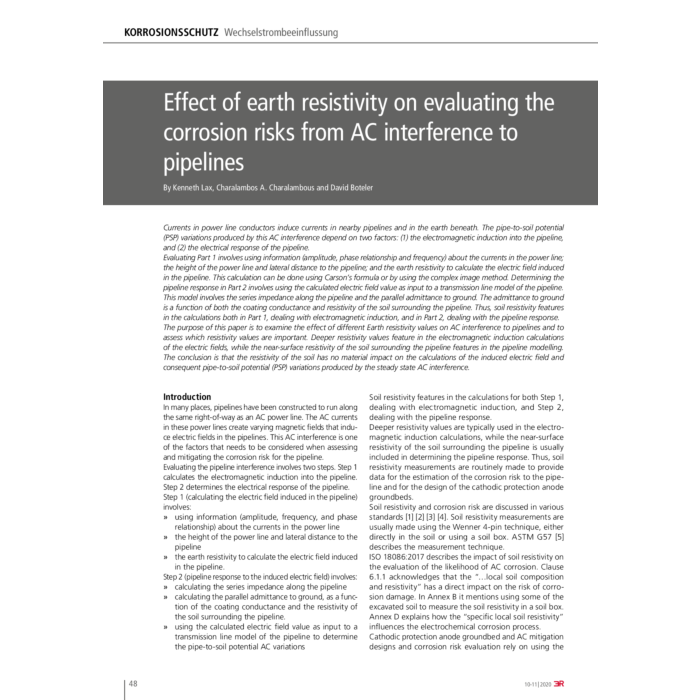Effect of earth resistivity on evaluating the corrosion risks from AC interference to pipelines
€4.90
In stock
article number
01252_2020_10-11_04
Currents in power line conductors induce currents in nearby pipelines and in the earth beneath. The pipe-to-soil potential (PSP) variations produced by this AC interference depend on two factors: (1) the electromagnetic induction into the pipeline, and (2) the electrical response of the pipeline. Evaluating Part 1 involves using information (amplitude, phase relationship and frequency) about the currents in the power line; the height of the power line and lateral distance to the pipeline; and the earth resistivity to calculate the electric field induced in the pipeline. This calculation can be done using Carson’s formula or by using the complex image method. Determining the pipeline response in Part 2 involves using the calculated electric field value as input to a transmission line model of the pipeline. This model involves the series impedance along the pipeline and the parallel admittance to ground. The admittance to ground is a function of both the coating conductance and resistivity of the soil surrounding the pipeline. Thus, soil resistivity features in the calculations both in Part 1, dealing with electromagnetic induction, and in Part 2, dealing with the pipeline response. The purpose of this paper is to examine the effect of different Earth resistivity values on AC interference to pipelines and to assess which resistivity values are important. Deeper resistivity values feature in the electromagnetic induction calculations of the electric fields, while the near-surface resistivity of the soil surrounding the pipeline features in the pipeline modelling. The conclusion is that the resistivity of the soil has no material impact on the calculations of the induced electric field and consequent pipe-to-soil potential (PSP) variations produced by the steady state AC interference.
| Authors | By Kenneth Lax, Charalambos A. Charalambous and David Boteler |
|---|---|
| Publishing Date | 27 Oct 2020 |
| Format | |
| Publisher | Vulkan-Verlag GmbH |
| Language | German |
| Pages | 4 |
| Title | Effect of earth resistivity on evaluating the corrosion risks from AC interference to pipelines |
| Description | Currents in power line conductors induce currents in nearby pipelines and in the earth beneath. The pipe-to-soil potential (PSP) variations produced by this AC interference depend on two factors: (1) the electromagnetic induction into the pipeline, and (2) the electrical response of the pipeline. Evaluating Part 1 involves using information (amplitude, phase relationship and frequency) about the currents in the power line; the height of the power line and lateral distance to the pipeline; and the earth resistivity to calculate the electric field induced in the pipeline. This calculation can be done using Carson’s formula or by using the complex image method. Determining the pipeline response in Part 2 involves using the calculated electric field value as input to a transmission line model of the pipeline. This model involves the series impedance along the pipeline and the parallel admittance to ground. The admittance to ground is a function of both the coating conductance and resistivity of the soil surrounding the pipeline. Thus, soil resistivity features in the calculations both in Part 1, dealing with electromagnetic induction, and in Part 2, dealing with the pipeline response. The purpose of this paper is to examine the effect of different Earth resistivity values on AC interference to pipelines and to assess which resistivity values are important. Deeper resistivity values feature in the electromagnetic induction calculations of the electric fields, while the near-surface resistivity of the soil surrounding the pipeline features in the pipeline modelling. The conclusion is that the resistivity of the soil has no material impact on the calculations of the induced electric field and consequent pipe-to-soil potential (PSP) variations produced by the steady state AC interference. |
Write Your Own Review

